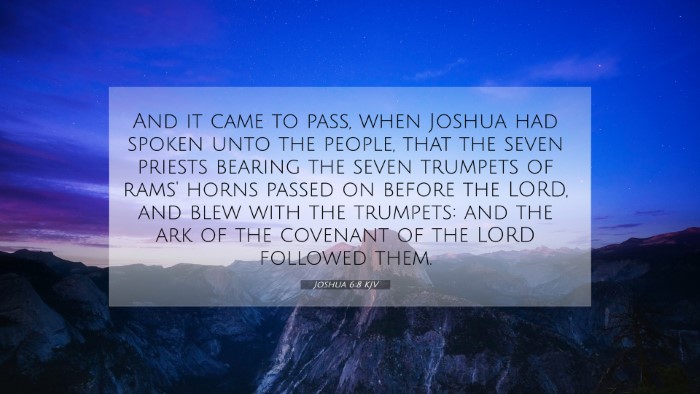Understanding Joshua 6:8
Joshua 6:8 says, "And it came to pass, when Joshua had spoken unto the people, that the seven priests bearing the seven trumpets of rams' horns passed on before the LORD, and blew with the trumpets: and the ark of the covenant of the LORD followed them."
Verse Meaning and Context
This verse describes a significant moment in the conquest of Jericho, highlighting the obedience of Joshua and the people of Israel. The blowing of the trumpets signifies a divine command and the presence of God's covenant, represented by the Ark.
- Leadership of Joshua: Joshua's role as a leader is emphasized here. He communicates God's instructions to the people, showcasing his authority and faithfulness.
- The Ark of the Covenant: The Ark symbolizes God's presence among His people, and its movement signifies God's active participation in the battle.
- Sound of Trumpets: The trumpets, used by the priests, are indicative of worship and the calling to attention. They prepare the people for the miraculous work that God is about to perform.
Insights from Commentaries
Matthew Henry's Commentary: Henry explains that this event reflects God's method of working through means that may seem weak or foolish to the world. By the use of trumpets, which are not typically instruments of warfare, God demonstrates that victory comes through faith and obedience, not military might.
Albert Barnes' Notes: Barnes points out that the act of blowing trumpets is an act of worship and proclamation. He connects this event to the theocratic principles of Israel, where the priesthood mediates between God and the people during critical moments in their history.
Adam Clarke's Commentary: Clarke elaborates on the significance of following the Ark. He states that the priests blowing the trumpets represent heralds, announcing the presence of God and His intentions, which is crucial before the impending miracle of Jericho's walls falling.
Cross-References
This verse connects with several other scriptures that enhance its meaning:
- Exodus 25:22: God expresses that He will meet with His people above the mercy seat, signifying the importance of the Ark.
- Hebrews 11:30: “By faith the walls of Jericho fell down after they were compassed about seven days,” highlighting the faith-based aspect of the conquest.
- Psalms 47:5: "God is gone up with a shout, the LORD with the sound of a trumpet," correlating the use of trumpets to divine victory.
- 1 Corinthians 14:8: “For if the trumpet give an uncertain sound, who shall prepare himself to the battle?” linking trumpet sounds to the call for preparation and action.
- Revelation 8:6: “And the seven angels which had the seven trumpets prepared themselves to sound,” showing the enduring symbolic nature of trumpets in God's plan.
- Joshua 3:6: Here, the priests carry the Ark into the Jordan River, as in the battle of Jericho, signifying God's guiding presence in Israel's journey.
- Luke 19:10: “For the Son of man is come to seek and to save that which was lost,” revealing God’s overarching purpose in leading His people to victory and salvation.
Reflections and Applications
This verse and its related insights remind us that God often works through unconventional means. The act of worship, represented by the blowing trumpets, plays a crucial role in invoking God's presence in our struggles.
- Faith and Action: It illustrates that our faith must be coupled with action, as shown by Joshua's leadership.
- God's Presence: The importance of recognizing God’s presence in our lives is paramount, especially when facing obstacles.
- Unity in Worship: The collective action of the priests and people demonstrates the power of unified worship and obedience to God’s commands.
Conclusion
Joshua 6:8 serves not only as a historical account but as a deeper reflection of the relationship between God and His people. By understanding the connections between Bible verses such as this one and others, we develop a richer theological comprehension and appreciation for the Scriptures. The thematic connections emphasize God's sovereignty and the necessity of faith in achieving His promises.




